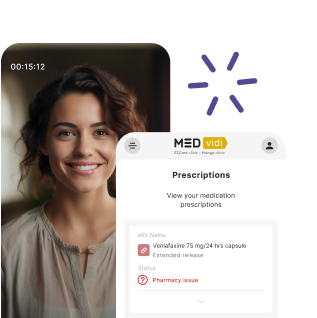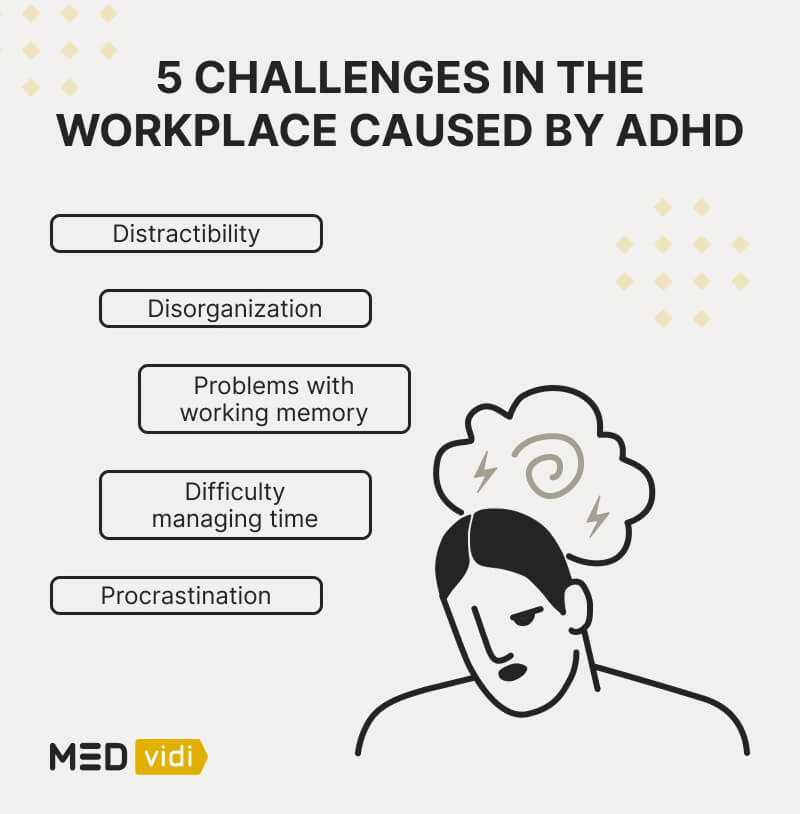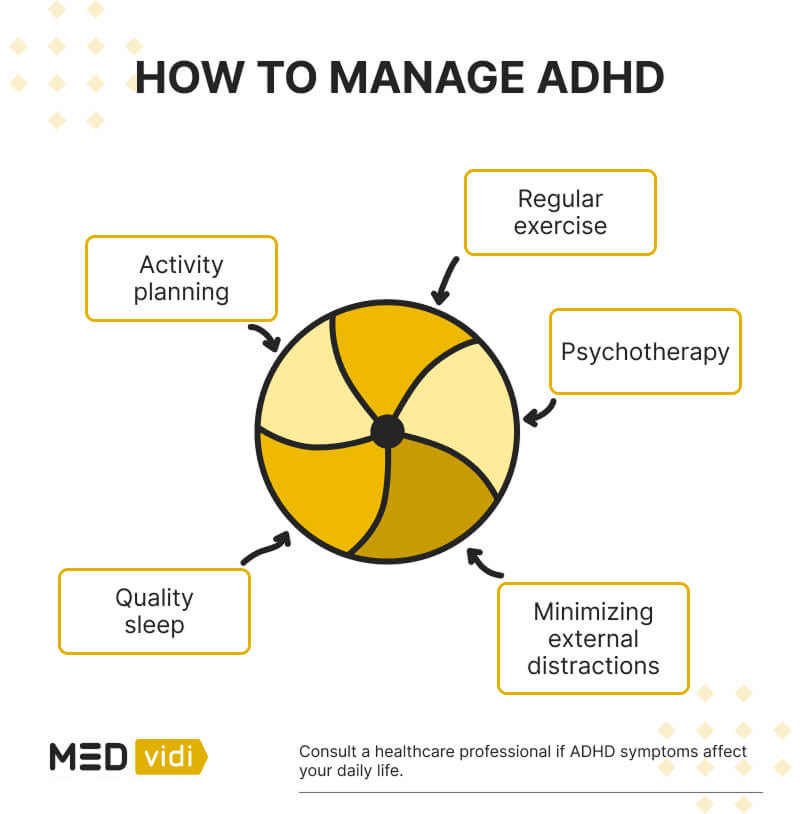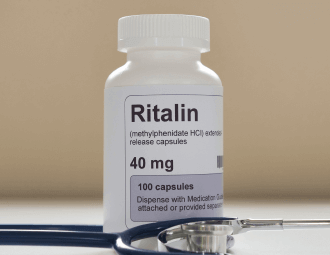Although attention deficit hyperactivity disorder can be managed, it may still cause issues before you find an effective way to deal with it. For example, it often makes finding and keeping a job difficult. However, remember that ADHD symptoms are not a barrier to success. By identifying your skills and interests and understanding the challenges associated with ADHD, you can find the right career path and enjoy professional success.
Highlights
- Living with adult ADHD doesn’t mean you can’t enjoy a successful career. But people with ADHD do deal with some challenges, including trouble focusing and managing time.
- Fortunately, there are many career fields, including creative ones, that are great for people with ADHD.
- Good careers for people with ADHD are usually fast-paced and flexible and offer dynamic work environments.
- To enjoy career success, seek positions that play into your ADHD strengths.
Understanding ADHD and Its Impact on Work
ADHD and Its Types
While many people think ADHD is only associated with children, adults can also be affected — and many get a diagnosis only in adulthood. Sometimes, years of coping with ADHD can have significant consequences on a person’s professional and personal lives.
The American Psychological Association recognizes three specific types of ADHD:
- Predominantly inattentive ADHD. Those diagnosed with this subtype have difficulty staying on task, struggle with racing thoughts, may become bored quickly, and have trouble organizing new information.
- Predominantly hyperactive-impulsive ADHD. These individuals are constantly “on the go.” They tend to get restless easily and have difficulty concentrating for lengthy periods, especially if they aren’t interested in the subject matter.
- Combined presentation. Those diagnosed with combined ADHD have difficulty maintaining prolonged concentration and are very energetic. They also struggle with impulsivity.
Although there is a genetic factor associated with ADHD, the exact cause remains unclear.

ADHD and IQ
The presence or absence of ADHD doesn’t affect a person’s intelligence quotient (IQ). People with the disorder may have lower, the same, or higher IQ than those without it. However, a
The above fact indicates that cognitive obstacles set by this condition may be challenging to overcome regardless of IQ. Still, it is possible to establish a successful career with ADHD if you are confident about your abilities. It is even possible to turn ADHD symptoms into strengths.
Common Workplace Challenges for People With ADHD
Neurodivergent adults deal with
Additional challenges that may affect adults with ADHD include:
- Problems with work-related functioning due to
lack of sleep[6] and fatigue. - Communication issues stemming from distractibility.
- Difficulty arriving at work and meetings on time because of time blindness.
- Coworker conflict due to hyperexpression of feelings.
When the environment isn’t a good match for someone with ADHD, their job performance may decrease, leading to feelings of failure and inadequacy. Research shows that the turnover rate of individuals diagnosed with ADHD is

ADHD-Friendly Work Environments
Work environments play an important role in a person’s ability to stay focused. Adults with ADHD may struggle with workplace issues if the environment isn’t suited to meet their needs.
The best jobs for people with ADHD are those that:
- Allow for flexible deadlines and the ability to structure one’s own time.
- Provide the option to work in multiple locations.
- Offer various engaging tasks to keep things interesting.
- Provide some guidance and clear goals but allow freedom for execution.
- Include opportunities for physical activity to release energy.
- Offer sensory-friendly spaces and accommodations to support focus.
Work environments that are supportive of employee mental health and a culture that encourages flexible work breaks and wellness benefits can improve focus and reduce burnout for people with ADHD. When ADHD individuals feel challenged and supported, they enjoy greater job satisfaction, avoid burnout, and have successful careers.
How to Choose a Career If You Have ADHD
Once you better understand what kind of work environment can suit you, it’s time to consider other, equally important factors — or even more important for some.
Understand Your Strengths
Every person with ADHD has specific strengths that may help them build fulfilling careers and experience professional success. Some thrive in environments that offer a variety of hands-on tasks, others may prefer a little more guidance but still need flexibility to deliver consistent performance.
The key is to identify these strengths and use them to your advantage. For example, you may be creative, highly energetic, and think outside the box because of your ADHD symptoms, or you may be empathetic and handle social interactions perfectly. Analyze whether you work better in a team or independently, whether you prefer structured or flexible plans, etc.
Identify What Fits Your Passions
Knowing your strengths and acknowledging the challenges caused by ADHD is the first step — but you’ll also benefit from having a career path aligned with your unique interests. The best jobs for someone with ADHD are not just flexible and intellectually stimulating, they are also based on strong passions. The area you love will help you manage your attention, get into the “flow” state, and turn the periods of hyperfocus into benefits.
Remember You Can Change Your Mind
Not all roles are a good fit for a person with ADHD. Moreover, the reality doesn’t always match expectations, and even when you choose the job based on your strengths and passions, you might find yourself willing to do something different eventually. Remember that there is a chance you’ll go through trial and error while looking for the most suitable career path, just like anyone else. Do not blame yourself and keep exploring!
To help you navigate this landscape, we’ve prepared a list of jobs people with ADHD often find suitable.

25 Best Jobs for People With ADHD
People with ADHD symptoms usually possess high energy, enjoy hands-on tasks, and work well independently. Several career fields are well suited for those who possess these qualities. Here are jobs that are good for people with ADHD.
#1 Healthcare
- Nurse. Nursing may be one of the best jobs for adults with ADHD. Nurses must work at a fast pace as they adapt to continuous changes and face daily challenges while on shift. Quick decision-making skills and the ability to multitask are unique ADHD strengths that work well within this field.
- Therapist. Empathy and creative problem-solving skills are traits that all great therapists should have. People with ADHD may thrive in this job because it is intellectually stimulating and provides plenty of opportunity for self-management and the flexibility to take breaks between seeing patients.
- Fitness trainer. As a fitness trainer, you need to be energetic and active to motivate others. If you are ready to learn more about anatomy, physiology, sports, and training techniques and share this knowledge, you may find this job suitable. You also have an option to become an online trainer.
- Veterinarian. Veterinary medicine allows people with ADHD to showcase their problem-solving skills as they treat and diagnose a wide variety of species and illnesses. Impulsivity is a trait many people with ADHD have, and this can be channeled into quick problem-solving and decision-making skills in veterinary emergencies. However, veterinary medicine can also be stressful and emotionally demanding and requires strong emotional regulation skills.
#2 Creative Roles
- Artist. When a person with ADHD works on something they’re passionate about, they often become
hyperfocused[9] . Artists can channel this trait as they work through the creative process. Creating music, art, or dancing can also be therapeutic and aid in emotional regulation, which is a common challenge for individuals with ADHD. - Graphic designer.
Research indicates[10] that creativity is associated with ADHD. If you have an eye for design and visual problem-solving skills, you may enjoy the flexibility that graphic design offers. Graphic designers create a variety of content, from website layouts to logo designs and advertisements. It is also a field that allows for flexible scheduling, which is great if you struggle with time management. - Photographer. Photography is an art that doesn’t require a particular schedule. You can plan your day according to your cognitive rhythms: learning new skills and editing photos in periods of hyperfocus and having photoshoots during hyperactivity periods.
- Freelance writer. Some people with ADHD enjoy a career in freelance writing due to the variety of content and creative freedom. It’s also a good job for introverts who prefer to work alone. However, the pressure to meet deadlines and focus on projects that aren’t of interest can make this work challenging.
- Marketing specialist. If you have cutting-edge social skills, high energy, and an ability to work well as part of a team, you may fit well into the marketing world. Today, it is much easier to work in marketing because of online technology. You get a chance to transform hyperactivity into creating winning advertisements, leading effective campaigns, having successful networking, and impressing clients.
- Journalist. Journalists must be quick-thinking, and the swift turnaround time and demand for constant content make this fast-paced job a good fit for adults with ADHD. This job is also interesting, which can keep those with ADHD engaged.
- Social media influencer. There is an increasing number of YouTube and social media influencers. Social media platforms (Facebook, Twitter, Instagram, TikTok, and others) have a broad reach, empowering young individuals to earn while working on their own schedules. Being an influencer requires constant energy and getting other people’s attention. Whether it is acting, singing, cooking, or any other, all you need is confidence to bring it to light through social media.
#3 Trades and Hands-On Work
- Chef. Chefs have to juggle many things at any given moment and still have to establish routines and ensure predictability. You may find that your ADHD traits, such as a high focus on things that interest you, can be helpful in the kitchen. If you have a passion for cooking, you may consider exploring it professionally.
- Construction professional. The constant movement and physical activity required in construction make this career ideal for adults with predominately hyperactive ADHD. There are also many opportunities to solve novel problems, which can be particularly motivating.
- HVAC specialist. One of the most lucrative positions for adults with ADHD is in the HVAC industry. There is also potential for growth and career advancement. HVAC careers require hands-on work, physical activity, and creative thinking to tackle issues as they arise.
- Plumber. For introverts and independent thinkers, a career in plumbing can be a good fit. Solving plumbing problems and seeing a tangible result from your effort can provide a sense of accomplishment, enhancing job satisfaction.
- Electrician. Like other related trades, electricians enjoy seeing the results of their hard work. The hands-on visual process is stimulating for ADHD brains, and the shorter training programs and decent salaries make it a good fit for many adults with attention deficit hyperactivity disorder.
#4 Sales
- Real estate agent. People with ADHD can excel in real estate. That’s because many have energetic personalities, which is perfect for interacting with potential clients and showcasing homes. They are also highly adaptable, which comes in handy for market strategy.
#5 Emergency Services
- Firefighter. Although ADHD is often negatively associated with risk-taking behaviors and impulsivity, some individuals can channel this energy into reacting quickly in emergency situations. Firefighters also have to simultaneously tackle several tasks, something that individuals with ADHD excel at.
- Police officer. Police officers must work quickly to solve problems while on duty. This fast-paced career field and the variety of calls they receive can keep ADHD brains engaged. However, those who struggle with emotional regulation may need to work on emotional management strategies to be successful in this field.
- Emergency medical technicians. People with ADHD often thrive in emergency service roles. EMTs must be able to function in intense circumstances to quickly assess situations, solve problems, and make split-second decisions, all of which are skills that those with ADHD are often good at.
#6 Education and Social Services
- Teacher. Energy and enthusiasm are common traits among adults with ADHD. These ADHD symptoms align well with teaching positions because the classroom is a dynamic and engaging workplace environment. There’s also the opportunity to explore a variety of topics and motivate students.
- Social worker. Social workers are empathetic and work to solve problems and come up with solutions that will benefit their client’s quality of life. Some individuals with ADHD exhibit strong interpersonal skills, which come in handy when building rapport and maintaining connections with clients and families.
#7 Entrepreneurship
- Small business owner or freelancer. Many people with ADHD excel at being their own boss. By owning a business that focuses on something you’re passionate about, you can benefit from the flexibility and autonomy of running the show. Because small business owners juggle a multitude of tasks, you won’t have to worry about becoming bored with your routine. You’ll likely do something different every day.
#8 IT and Corporate Roles
- Software developer. Adults with attention deficit hyperactivity disorder can thrive in the world of software development and coding. Many people with ADHD have a
high IQ[11] , and this field can give ADHD brains the right amount of creative stimulation to excel in the workplace. Not only are software developers tasked to solve problems, but once they do, there’s always a new one to tackle. This can help adults with ADHD stay focused and experience personal fulfillment. - Project manager. Project managers have to handle a variety of tasks, adapt to changing circumstances, and think outside the box to come up with workable solutions. These can be good jobs for those with ADHD.
Are There Jobs to Avoid With ADHD?
Some roles are more difficult for people with attention deficit hyperactivity disorder. Those requiring you to follow a rigid schedule, complete routine tasks or offer low stimulation can lead to boredom, making it hard to stay motivated. Some examples include:
- Routine desk jobs
- Accounting
- Assembly line work
- Customer support services
- Data entry
- Commercial truck driving
While those with ADHD may struggle with some of the above positions, it doesn’t mean you can’t be successful in them. If these careers pique your interest, you may just need to request additional accommodations or use a few creative strategies to excel.

6 Tips for Managing ADHD in the Workplace
Whether you’re currently working in a challenging role or are looking for additional tips to help you achieve career success, you can improve your focus and overall well-being with the following tips:
- Minimize distractions. Noise-cancelling headphones can eliminate distractions and help you stay on track.
- Establish a structured routine. Routines create predictability, which may calm ADHD minds. Use checklists and set specific times of the day to knock out certain tasks.
- Utilize technology. Use tools to stay focused and improve organization. Timers, reminders, notes apps, and task managers can help you stay organized.
- Don’t keep it quiet. Workplace issues are common for those with ADHD. Be your own advocate. If you need a quieter workspace, flexible deadlines, or other accommodations, speak up.
- Find an accountability partner. Seek the support of a colleague or mentor you can check in with to help you stay accountable and on track.
- Schedule breaks. People with ADHD benefit from taking short (15-minute), frequent breaks, especially if the task is tedious and mundane.
- Seek professional help.

In Conclusion
If you are still struggling to find the right job and are unsure how to use your skill set to your advantage, you may benefit from seeking therapy or online ADHD treatment. Working with a licensed medical provider can give you further insight into your strengths and personal work style. Professional treatment can also help you manage your symptoms so you can discover the perfect career paths for you.













